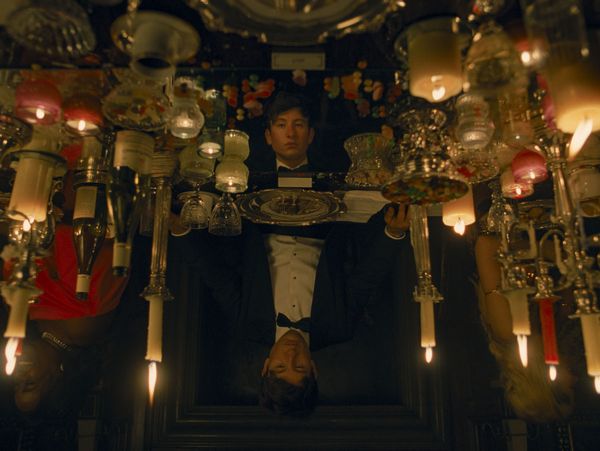“Saltburn” director on bad behavior, Jacob Elordi’s eyebrow piercing and many “types of seduction”
Writer/Director Emerald Fennell’s sophomore feature, “Saltburn” is not unlike her Oscar-winning “Promising Young Woman” in that it features manipulation and men behaving badly. This story is told from the point of view of Oliver (Barry Keoghan, from “The Banshees of Inisherin” and “Eternals”) who befriends the wealthy and handsome Felix (Jacob Elordi) at Oxford.
“We live twin lives of self-delusion, thinking and hoping we are good people and secretly knowing we’re probably not.”
Oliver is a scholarship student, but he helps Felix out of a jam, and his kindness is repaid a thousandfold. Oliver is eventually invited to summer at Saltburn, Felix’s family estate. Felix’s mother, Elspeth (Rosamund Pike) and father Sir James (Richard E. Grant) welcome him, as does Felix’s sister, Venetia (Alison Oliver), but Felix’s cousin Farleigh (Archie Madekwe, from “Gran Turismo”) clocks Ollie as a sly fox. Needless to say, things good and bad start to happen. Lies are told, trouble ensues and before long, bodies pile up.
Fennell captures all the bad behavior in a way that seduces viewers, but also makes them complicit in the manipulation. Watching Felix in the bathtub, as Oliver does in one scene that is sure to have viewers gasping, is quite naughty. As Oliver tries to maintain a sense of control in a hothouse environment, “Saltburn” reveals some dark truths about human nature.
Salon chatted with Fennell about her devious new film.
Your films depict men who behave very badly. The features you have directed are all about manipulation. Why explore this dark side of human nature?
I supposed because we all behave badly. We live twin lives of self-delusion, thinking and hoping we are good people and secretly knowing we’re probably not. That tension between “I’m a good person,” and “I’m not a good person,” is what I’m interested in. I suppose people do behave badly in “Saltburn,” but there is a certain amount of wish fulfillment in that.
Oliver almost passes with the privileged class as Farleigh indicates. What observations do you have about Oliver’s codeswitching?
He hesitates. When you live in a world where everyone pretends there are no rules, and there are rules everywhere, the hesitation is all everyone notices. It grinds things to a halt. The kind of complaint is not overt. But it’s difficult to talk about him because of the construct of this genre and this film, because you don’t know if he’s the lamb or the wolf.
Codeswitching is what we all do when we try to seduce someone, or become friends, or get a job, or do a phone interview with Salon.com. We are all different people all the time. I am acutely aware of that myself. How worryingly adaptable I am. Everyone is, whether they acknowledge it or not. What I find endlessly fascinating and wonderful about Oliver is his almost supernatural ability to see something in someone even if they don’t know what it is they want.
As a writer, director or actor, your job is to see people and understand what is underneath the action, what is the motive? I feel Oliver-y maybe in that sense. You are giving people what they want — or think they want. Or what they don’t want, but in a way they do. That’s the game, the dance and it’s thrilling. Oliver is doing what we’re all doing, just better.
 Barry Keoghan as Oliver in “Saltburn” (Amazon Studios/MGM)
Barry Keoghan as Oliver in “Saltburn” (Amazon Studios/MGM)
As you say, he gives people what they want or think they want. What is the appeal of the cuckoo-in-the-nest story? Can you talk about shaping his interactions with others?
Absolutely, with that cat amongst the pigeons, there is a sense that you see someone who comes in and takes everyone down one by one in a different way. You see Oliver take info and use it. It is immediate; everything is a clue — that someone is a masochist, or not comfortable with their body. It’s also about the different types of seduction, not necessarily sexual. It’s about making others feel good. That’s the role of the acolyte — to see and anticipate and know the other person better.
Why is Felix attracted — if that is the right word — to Oliver?
“Obsession is so deep and intense that it explodes everything else.”
In Hollywood, the star doesn’t see the things stylists and PAs see when another person comes in. Felix is very, very beautiful and rich and charming. He’s not terribly bright. He doesn’t have to be. What he likes and wants is to be a real person, a normal guy. Just a guy. Like all stars. They all want to be normal, but they are not. Like all rich don’t want to marry gold diggers even though they made money to get women. We are all engaged in this kind of stupid denial all the time.
How did you work at presenting the relationship between Oliver and Felix? You do fetishize Jacob Elordi in the film, especially with that eyebrow piercing that I found so incredibly sexy.
I fought so hard for that eyebrow piercing! Here’s the thing — if “I wasn’t in love with him” is the first thing a person tells you, followed by the most beautiful pics of this beautiful man, do you take that at face value? Do you believe him? He says it, but does that make it true?
Obsession is so deep and intense that it explodes everything else. It punctures things like unrequited love. You are so alive with desire it electrifies everything else around you. Felix is so used to being an object of desire, it is almost not peculiar to him — it’s a way of living. A [bathroom] door left ajar does not mean an invitation, but there is an acknowledgement. It is giving people what they want. There is pleasure in being watched, too.
“Saltburn” certainly addresses issues of race, class and sexuality. Are you satirizing the idle rich?
Don’t you want to be there? I hope I’m skewering us as much as them for wanting something we can’t have and being permanently engaged in a voyeuristic life. We are all in a state of permanently wanting things we can’t have and don’t need. I am interested in what that is and why that is.
You worked as an actress most recently in “The Crown” and “Barbie.” Can you talk about shifting your career to writing and directing?
When I was working on a show in England for four years, I would write a novel every time I was on break. I wrote and grew in parallel. Everything has enabled me to get to the place where my heart lies, which is in writing and directing.
“Saltburn” opens in select theaters on Nov. 17, and in theaters everywhere Nov. 22.
Read more
director interviews by Gary Kramer


